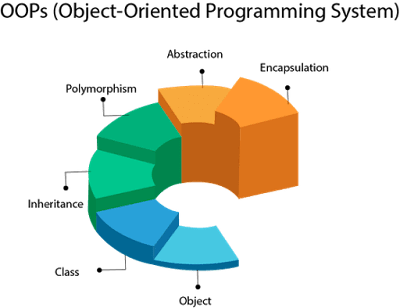Java OOPs Concepts
In this page, we will learn about the basics of
OOPs. Object-Oriented Programming is a paradigm that provides many concepts
such as inheritance, data
binding, polymorphism, etc.
Simula is
considered the first object-oriented programming language. The programming
paradigm where everything is represented as an object is known as a truly
object-oriented programming language.
Smalltalk is
considered the first truly object-oriented programming language.
The main aim of object-oriented programming is
to implement real-world entities for example object, classes, abstraction,
inheritance, polymorphism, etc.
OOPs (Object-Oriented Programming System)
Object means
a real-world entity such as a pen, chair, table, computer, watch, etc. Object-Oriented
Programming is a methodology or paradigm to design a program using classes and
objects. It simplifies the software development and maintenance by providing
some concepts:
- Object
- Class
- Inheritance
- Polymorphism
- Abstraction
- Encapsulation
Object
Any entity that has state and behavior is known as an object. For
example a chair, pen, table, keyboard, bike, etc. It can be physical or
logical.
An Object can be defined as an instance of a class. An object
contains an address and takes up some space in memory. Objects can communicate
without knowing the details of each other's data or code. The only necessary
thing is the type of message accepted and the type of response returned by the
objects.
Example: A
dog is an object because it has states like color, name, breed, etc. as well as
behaviors like wagging the tail, barking, eating, etc.
Class
Collection of objects is called class. It is a
logical entity.
A class can also be defined as a blueprint from which you can
create an individual object. Class doesn't consume any space.
Inheritance
When one object acquires all the properties and behaviors of a
parent object, it is known as inheritance. It provides code reusability. It is
used to achieve runtime polymorphism.
Polymorphism
If one task is performed by different ways, it is
known as polymorphism. For example: to convince the customer differently, to
draw something, for example, shape, triangle, rectangle, etc.
In Java, we use method overloading and method overriding to
achieve polymorphism.
Another example can be to speak something; for example, a cat
speaks meow, dog barks woof, etc.
Abstraction
Hiding internal details and showing functionality is
known as abstraction. For example phone call, we don't know the internal
processing.
In Java, we use abstract class and interface to achieve
abstraction.
Encapsulation
Binding (or wrapping) code and data together into a single unit
are known as encapsulation. For example capsule, it is wrapped with
different medicines.
A java class is the example of encapsulation. Java bean is the
fully encapsulated class because all the data members are private here.






No comments:
Post a Comment